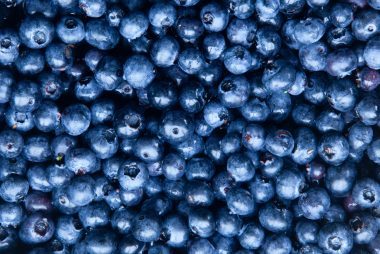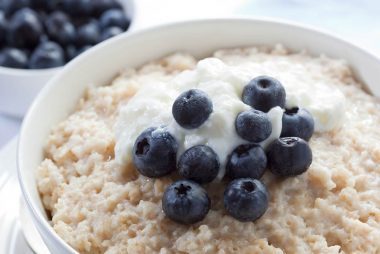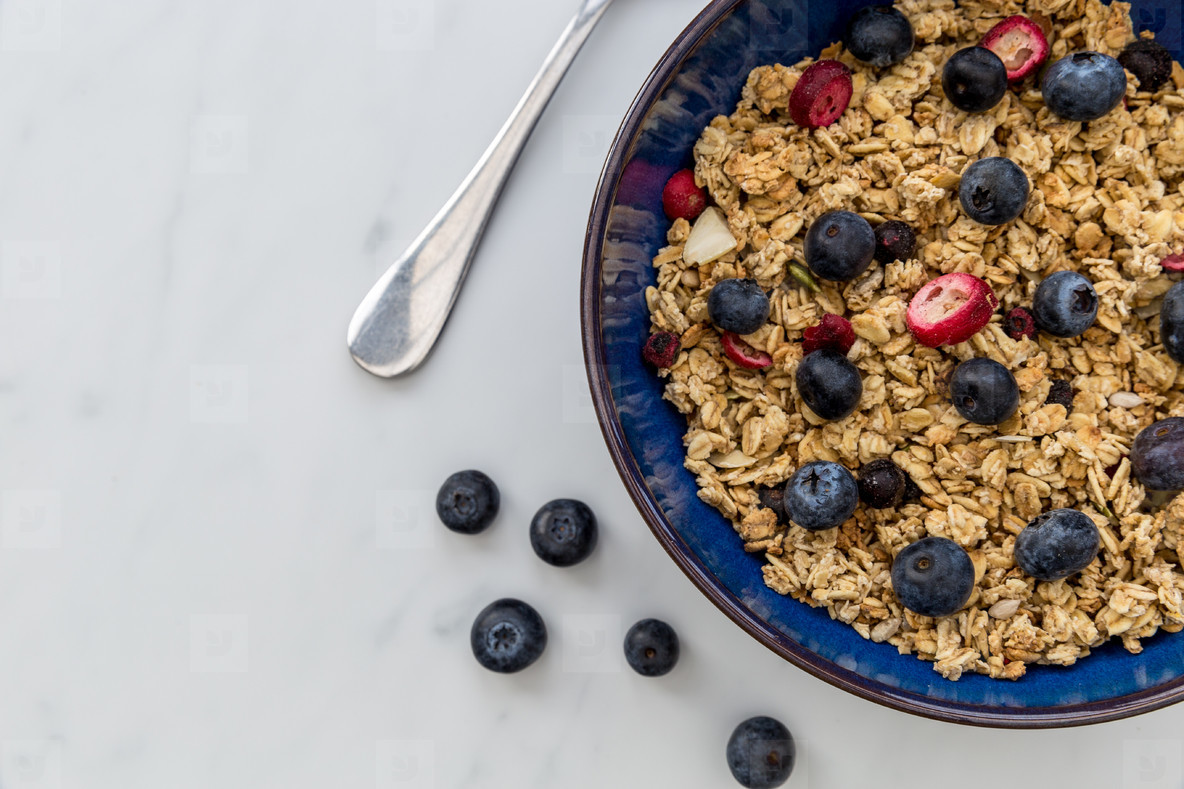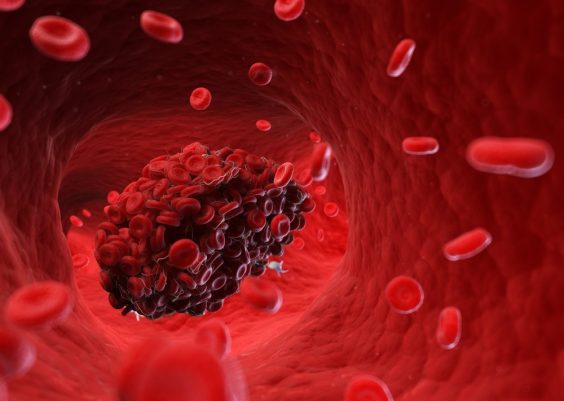You could boost your memory
 “Memory has been touted with blueberries,” says registered dietitian nutritionist Caroline Passerrello, MS, RDN, LDN. One long-term study of 16,010 adults age 70 or younger found that those who ate more blueberries and strawberries delayed age-related cognitive decline by up to 2.5 years. The researchers guess that antioxidants called anthocyanins in blueberries could be behind the effects. Other studies have found that large doses of resveratrol could slow the progress of Alzheimer’s disease.
“Memory has been touted with blueberries,” says registered dietitian nutritionist Caroline Passerrello, MS, RDN, LDN. One long-term study of 16,010 adults age 70 or younger found that those who ate more blueberries and strawberries delayed age-related cognitive decline by up to 2.5 years. The researchers guess that antioxidants called anthocyanins in blueberries could be behind the effects. Other studies have found that large doses of resveratrol could slow the progress of Alzheimer’s disease.
You’ll fight wrinkles
 A cup of blueberries packs in nearly a quarter of your daily needs for vitamin C, which can help your body build and maintain collagen, a protein that gives your skin firmness. “The more collagen you have, the less likely you are to have wrinkles,” says Passerrello. Women who get more vitamin C are less likely to have wrinkled skin, found a study of 4,025 middle-aged women in the American Journal of Clinical Nutrition. Don’t miss these other foods that fight wrinkles.
A cup of blueberries packs in nearly a quarter of your daily needs for vitamin C, which can help your body build and maintain collagen, a protein that gives your skin firmness. “The more collagen you have, the less likely you are to have wrinkles,” says Passerrello. Women who get more vitamin C are less likely to have wrinkled skin, found a study of 4,025 middle-aged women in the American Journal of Clinical Nutrition. Don’t miss these other foods that fight wrinkles.
You’ll boost your immune system
 When you have inflammation in your body, it’s harder to kick a disease. “Your defense system and immune system is taking time tending to where the inflammation is coming from,” says registered dietitian nutritionist Marjorie Nolan Cohn, MS, RDN, spokesperson for the Academy of Nutrition and Dietetics. Blueberries are famously high in antioxidants, which can help keep inflammation levels down. In particular, their high levels of vitamin C can give your immune system a boost, says Passerrello.
When you have inflammation in your body, it’s harder to kick a disease. “Your defense system and immune system is taking time tending to where the inflammation is coming from,” says registered dietitian nutritionist Marjorie Nolan Cohn, MS, RDN, spokesperson for the Academy of Nutrition and Dietetics. Blueberries are famously high in antioxidants, which can help keep inflammation levels down. In particular, their high levels of vitamin C can give your immune system a boost, says Passerrello.
Content continues below ad
You could prevent cancer
 An antioxidant-rich diet could also help your body fight cancer. If your body is too busy fighting inflammation, it might not notice DNA mutations that lead to cancer. “Our DNA is always replicating and tripping up that process, but our body is really good at catching it,” says Nolan Cohn. “When our body misses it, that messed-up DNA goes on to replicate itself.” Studies have linked pterostilbene, an antioxidant in blueberries, to protection against esophagus, pancreas, and colon cancers. Read more about cancer-fighting foods.
An antioxidant-rich diet could also help your body fight cancer. If your body is too busy fighting inflammation, it might not notice DNA mutations that lead to cancer. “Our DNA is always replicating and tripping up that process, but our body is really good at catching it,” says Nolan Cohn. “When our body misses it, that messed-up DNA goes on to replicate itself.” Studies have linked pterostilbene, an antioxidant in blueberries, to protection against esophagus, pancreas, and colon cancers. Read more about cancer-fighting foods.
You’ll snack less before lunch
 A cup of blueberries has between three and four grams of fiber, which helps you feel more satisfied with just 85 calories. “They’re really low in calories for the fiber content,” says Nolan Cohn. “You get more bang for your buck.” Even though they’re low-calorie, they’re also sweet, so you could get away with eating a less sugary cereal with flavor boost from berries. Check out these other great foods for weight loss.
A cup of blueberries has between three and four grams of fiber, which helps you feel more satisfied with just 85 calories. “They’re really low in calories for the fiber content,” says Nolan Cohn. “You get more bang for your buck.” Even though they’re low-calorie, they’re also sweet, so you could get away with eating a less sugary cereal with flavor boost from berries. Check out these other great foods for weight loss.
You could control diabetes
 Diabetics could benefit from having that fiber from blueberries at breakfast. “Studies show unequivocally that higher fiber diets help control blood sugar and blood glucose, and help stabilize insulin levels,” says Nolan Cohn. If you use the American Diabetic Association’s exchange diet, blueberries also give you a bigger serving of fruit than you’d get from, say, fruit cocktail, so you’ll get in a bigger, more satisfying portion, says Passerrello. Avoid these bad eating habits for diabetes.
Diabetics could benefit from having that fiber from blueberries at breakfast. “Studies show unequivocally that higher fiber diets help control blood sugar and blood glucose, and help stabilize insulin levels,” says Nolan Cohn. If you use the American Diabetic Association’s exchange diet, blueberries also give you a bigger serving of fruit than you’d get from, say, fruit cocktail, so you’ll get in a bigger, more satisfying portion, says Passerrello. Avoid these bad eating habits for diabetes.
Content continues below ad
You could protect your heart
 The benefits of fiber don’t end there—studies have shown it can also lower “bad” LDL cholesterol and increase “good” HDL. Plus, blueberries contain potassium, an electrolyte that helps your heart’s electrical system, and are packed with antioxidants. “Blueberries contain antioxidants, and these have been shown to be cardioprotective,” says Passerrello. A 16-year study found linked diets rich in anthocyanins—like in blueberries—to a lower risk of death from coronary heart disease. Beware of these foods that are bad for your heart.
The benefits of fiber don’t end there—studies have shown it can also lower “bad” LDL cholesterol and increase “good” HDL. Plus, blueberries contain potassium, an electrolyte that helps your heart’s electrical system, and are packed with antioxidants. “Blueberries contain antioxidants, and these have been shown to be cardioprotective,” says Passerrello. A 16-year study found linked diets rich in anthocyanins—like in blueberries—to a lower risk of death from coronary heart disease. Beware of these foods that are bad for your heart.
Your bones will stay strong
 Blueberries contain a quarter of your daily needs for manganese, a mineral that plays a key role in healthy bones by shuttling nutrients around your body. “It helps the body process the foods and use nutrients correctly to help bone development,” says Passerrello. Blueberries also contain some calcium and magnesium. You likely already know that calcium builds strong bones, but magnesium helps deliver that calcium to the bone so it can do its job, says Nolan Cohn. (Find out magnesium is the key to better fitness.)
Blueberries contain a quarter of your daily needs for manganese, a mineral that plays a key role in healthy bones by shuttling nutrients around your body. “It helps the body process the foods and use nutrients correctly to help bone development,” says Passerrello. Blueberries also contain some calcium and magnesium. You likely already know that calcium builds strong bones, but magnesium helps deliver that calcium to the bone so it can do its job, says Nolan Cohn. (Find out magnesium is the key to better fitness.)
Content continues below ad





